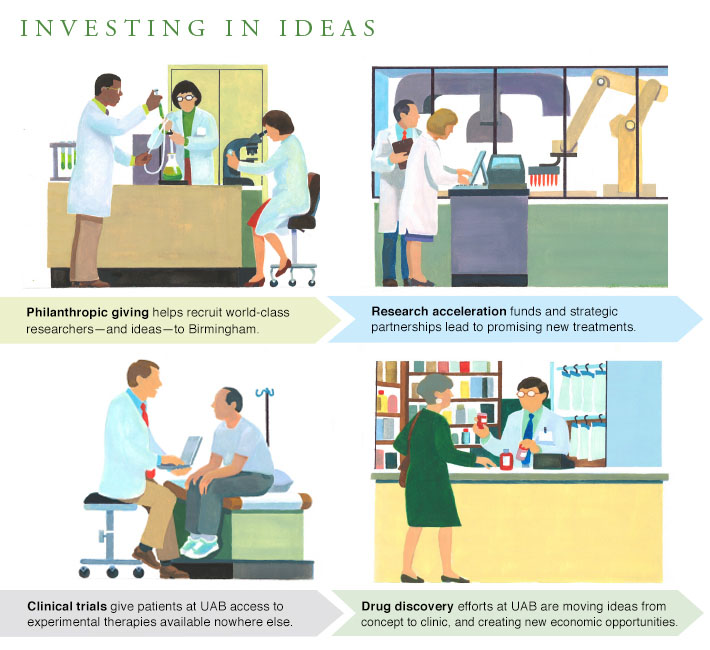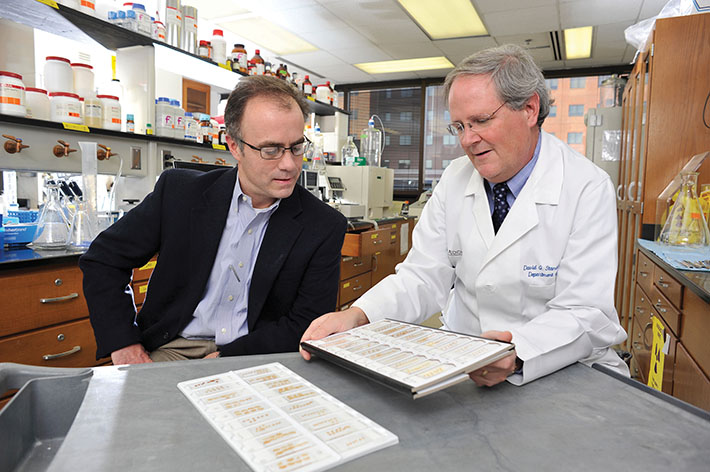
Partners in Progress
Strategic Funding Accelerates Research
By Matt Windsor • Illustrations by Ernie EldredgeIn July 2005, after months of troubling symptoms, inconclusive tests, and incomplete answers, Ken Cater finally received the definitive diagnosis he wanted—and the answer he dreaded. Cater, like actor Michael J. Fox, had early-onset Parkinson’s disease.
“I went into that spot where you don’t like to go and had my moment and cried on the sofa with my dog and family,” says Cater, an executive at SSOE Group, a global engineering firm. “After that I didn’t look back. I’m an engineer. I’m used to having a problem, finding a solution, and moving on.”
Cater arranged a meeting with Ray L. Watts, M.D., an international expert on Parkinson’s disease who was then chair of the UAB Department of Neurology and is now the university’s president. “I said, ‘What can I do to help?’” Cater recalls. Watts said his top priority was recruiting David Standaert, M.D., Ph.D., to UAB from Harvard University. “Dr. Watts said, ‘He’s the best there is, and I want to get him here,’” says Cater. “I responded, ‘What do we have to do to make that happen?’”
Cater’s financial support, along with Watts’s vision for a new kind of research program, helped convince Standaert to come to Birmingham to lead the UAB Center for Neurodegeneration and Experimental Therapeutics, known as CNET. The center’s mission is “to accelerate progress,” Standaert explains. “Dr. Watts and I are both physicians, and we’ve been treating patients with Parkinson’s and other diseases for a long time. We work with patients every day who are desperate for a cure, and we really felt there was a need for a group that would try to move this agenda forward, to take the discoveries going on in the lab and turn them into therapies.”
To attain that goal, Standaert launched his own recruiting drive. In seven years, CNET has grown “from just me to 50 scientists, students, postdocs, and staff,” Standaert says. “And we’re still recruiting.” CNET researchers have contributed to an explosion in Parkinson’s discoveries, says Standaert, who is now chair of the Department of Neurology. “The amount we’ve learned in the past five years exceeds everything we knew from the previous 200 years.”
CNET is a major participant in the Alabama Drug Discovery Alliance (ADDA), a partnership among UAB, Southern Research Institute, and the Birmingham Business Alliance that is designed to speed the translation of UAB discoveries into clinic-ready treatments. CNET researchers already have two promising drug compounds, Standaert says. Andrew West, Ph.D., is testing a compound that inhibits LRRK2, “a molecule closely related to Parkinson’s,” Standaert explains, while Erik Roberson, M.D., Ph.D., is studying several molecules that could impact Alzheimer’s disease. (Roberson and West are now co-directors of CNET.) “Within a matter of months, we have moved these much farther than many places could have done in years,” Standaert says. (For more on new discoveries in the ADDA drug pipeline, see “Discovery Zone" below.)
The Power of Philanthropy
The recruitment of West and Roberson, Standaert emphasizes, would not have been possible without philanthropic giving. “Dr. West is supported by John Jurenko through a very generous gift that not only founded his lab but has endowed his position,” Standaert says. “Dr. Roberson is one of the top Alzheimer’s disease researchers in the country. A lot of places wanted to have him, but Virginia and Bill Spencer created an endowment that helped us land him here.” In fact, “almost all of the major faculty recruitments we have done have been based on philanthropic gifts,” Standaert says.
Philanthropic gifts have become particularly important as the nation’s research funding environment has changed in recent years, Standaert says. “The National Institutes of Health (NIH) has contracted what they are willing to do. They are not taking any risks because they have such limited funds. If you have a new idea and you want it to move quickly, the way you do that is through research acceleration funds—philanthropic gifts that enable us to launch projects, get them moving, and then go out and seek federal or industry funding to carry them forward to the conclusion.”
The Parkinson’s Association of Alabama (PAA), currently led by Cater, has played a role in several major recruitments for CNET, including the next generation of promising researchers, Standaert says. Talene Yacoubian, M.D., Ph.D., came to UAB from Harvard University in 2012 as the first Parkinson’s Association of Alabama Scholar in Parkinson’s Research. The PAA “supported her lab and transition costs and has helped launch her research,” Standaert says.
The PAA’s initial $100,000 investment allowed Yacoubian to receive an $800,000 NIH grant, Cater notes. “That’s an amazing rate of return, any way you look at it,” he says. Funding from the PAA has also helped encourage graduate students to enter the Parkinson’s field. “We have a lot of students at UAB who would like to get involved in this research, but finding support for them is not always that easy,” Standaert says. “So the PAA has stepped up with philanthropic funding that has let us go out and bring in the top students and put them to work on Parkinson’s disease here in the lab.”
“If we change the life and outlook of even one person, it’s worth every dollar,” Cater says. But he is optimistic that CNET research will change many more lives. “I believe we have the tools in place in Alabama and at UAB to solve the problem of Parkinson’s disease.”
 With support from Ken Cater (left) and other donors, David Standaert (right) has recruited top research talent to UAB and helped spark an explosion in discoveries related to Parkinson’s disease.
With support from Ken Cater (left) and other donors, David Standaert (right) has recruited top research talent to UAB and helped spark an explosion in discoveries related to Parkinson’s disease.Discovery Zone
Three of a number of promising compounds developed by UAB researchers as part of the Alabama Drug Discovery Alliance:
LRRK2 inhibitors
Most patients with Parkinson’s disease are still treated with a 42-year-old drug called L-dopa, which only temporarily limits tremor, rigidity, and other symptoms. But LRRK2 inhibitors actually counter the inflammation and nerve cell death causing Parkinson’s symptoms. UAB researchers are now working to find the best drugs that inactivate LRRK2. The investigators believe their current version is better on many levels than any other drugs being considered for LRRK2, and that even more effective drug candidates are right around the corner.
CD38 inhibitors
The enzyme CD38, which seems to reduce oxidative stress, is overexpressed in several cancers, particularly B cell lymphomas such as leukemia and multiple myeloma that often affect older patients. That’s a problem, because chemotherapy causes oxidative stress in order to damage the DNA of cancer cells and cause them to self-destruct. UAB researchers have been looking for an effective CD38 inhibitor, and they have identified several candidates thanks to screening tests conducted by scientists at Southern Research Institute, UAB’s partner in the ADDA. These compounds are now being tested in UAB labs.
Cytochrome C oxidase inhibitors
The brain cancer known as glioblastoma multiforme is particularly lethal because its cells quickly become resistant to treatment. Previous UAB research found that the enzyme cytochrome C oxidase was abundant in cells resistant to therapy. Patients who have an overactive version of the gene responsible for making cytochrome C oxidase live less than half as long as patients with a less active version. A compound being developed by UAB researchers to inhibit cytochrome C oxidase could increase survival by six months—a significant advance for this patient population.
Track RecordAs of 2013, the UAB Research Foundation has helped create 58 start-up companies and negotiate more than 430 option and license agreements exceeding $68 million in revenues. |
Get Involved
• Give something and change everything by accelerating UAB research breakthroughs and new treatments for patients.
• Read more about The Campaign for UAB and how it will transform our community.
